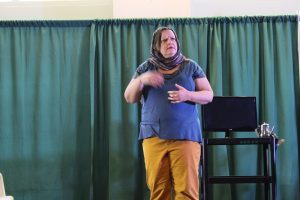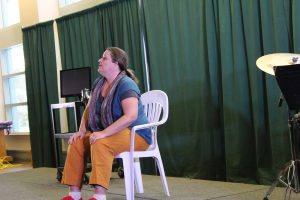Kim Schultz wowed audience members in her one-woman show on March 11, 2019 in the Sarazen Student Union. The actor, writer, artist and advocate came to Siena to perform “No Place Called Home,” a narrative about her experiences in Syria while visiting Iraqi refugees in 2009. It is a story of love, pain, laughter and tears that has been performed at a number of institutions, including the Kennedy Center in Washington D.C., as well as off-Broadway in New York City.

The play begins on a minimal stage with only a few props including a chair, a television and a tea kettle. The scene opens up to Schultz at an event for displaced Iraqi artists a few days before the end of her trip where she meets the man she will fall in love with. His name was Omar and she describes the short time they have together navigating the city, the culture and their language barrier. Eventually, in a moment of great emotion and some confusion, Schultz kisses Omar only to retract and exclaim that this was not supposed to be a love story.
Instead of acknowledging the kiss, Schultz suddenly was overcome by loud music and singing until she assumed the role of a woman from Baghdad. To embody the new character, the scarf that she originally had tied around her waist was now situated about her head, her movement was more reserved and she adopted a thick accent, occasionally adding in Arabic words as well. The character was explaining that her family was attempting to enter the United States because her husband was being threatened for his work. Even after leaving Iraq, she was still afraid to go outside, describing it was “moving from one prison to another.” Then, just as quickly as Schultz became the woman character, she transformed again into a loud, enthusiastic older man raving about television and lamenting about the differences between Saddam Hussein’s rule and the Bush Democracy. He explained that even though Saddam was a terrible dictator, the people of Iraq knew how to live under him and now they have no freedom.

Every few transitions, Schultz would break character to explain some context in the scenes or teach some Arabic. She explained the importance of knowing the word “shukraan” which means thank you. In every house you entered, the occupants would offer you tea or coffee and it was rude to refuse so she was saying “Shukraan!” more often than not. She described the Iraqi refugees as some of the most kind and hospitable people she had ever met and yet most countries turned them away when they were seeking asylum. She also explained that all the refugees brought their televisions along with them when they were evacuating the city; while that may not seem like a necessity, the people thought they would eventually be able to return home instead of being trapped in another country for years.
Schultz continued to act as a number of characters including a mother, a child, a young man with a bad ankle, a boxer and a poet. Each transformation emitted an entirely new energy as she changed her hair, the props she used, the way she moved her body and her voice. At some points, she would be calm and collected like when she was a mother boasting about her children, while at other times her shouts filled the room and tears could be seen in her eyes like when the poet exclaimed, “No place in Iraq for us. No place called home.” Each story she told became darker and heavier than the one before. The characters spoke of death, destruction and torture until it was as if it was too much for Schultz herself to handle. Once again, the music picked up and the singing grew louder and louder until Schultz, overcome by emotion, transitioned back to where her story began, with the kiss. As the play drew to a close, Schultz finally admits that her experience with the Iraqi refugees was also a love story with Omar and he was the only one she could actually save.
Photos provided by Najja (Chad) O’Connor
